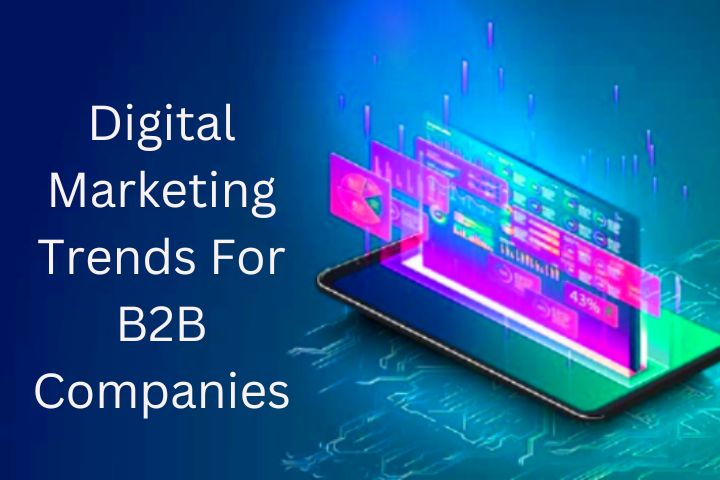Digital Marketing Trends For B2B Companies : The entry into 2022 arrives with a variety of technological trends. The general principle driving these changes is that the customer demands much more. Increasing competition and the race for profitability amid the pandemic have put the customer in the driver’s seat. The old paradigm of leading the customer is gradually being phased out in favor of a new one: following customers and serving their requirements.
As technology changes B2B marketing strategies, companies need to stay on top of industry developments. If you’re struggling to decide where to invest your time and resources in the face of the constant stream of new technology and execution techniques. Acquiring any or all of them would mean staying relevant and on the cutting edge. top of the growing competition. Here are the digital marketing trends for B2B companies.
Table of Contents
Account-based Marketing
Account-Based Marketing (ABM) is a modern approach pivoting on B2B marketing in which marketers and sales staff collaborate to identify and convert the most suitable customers.
Success with this approach will require sales and marketing teams to work closely together to help marketers find the most qualified prospects for an ABM strategy within the target population.
Small businesses can benefit from this strategy with a powerful combination of their sales and marketing teams using ABM to target their resources and marketing efforts more effectively. It is one of the best strategy for digital marketing trends for B2B companies.
Compared to other marketing activities, ABM provides a 97% higher return on investment. Ultimately, AMB helps align sales and marketing activities for B2B companies by ensuring efficient use of marketing resources.
Email Personalization
Email marketing is the most successful channel to reach a larger audience. According to the Content Marketing Institute report, 68% of B2B companies consider email newsletters to be one of the best ways to nurture leads. That’s why it becomes critical to personalize emails that deliver quality leads with enhanced conversions through an email.
Another report suggests that 70% of B2B companies that adopted email personalization achieved an exceptional return on investment (ROI). Thanks to the variety of templates and technologies that make personalization, reach, and audience segmentation simpler than ever.
Also, during the pandemic, the world embraced digital signatures to save time and effort, and minimize unnecessary physical contact and wasted paper. Digital signatures can be easily leveraged in emails to improve security and credibility.
B2B email personalization is a big step up from mass emails that get no results. B2B companies can now run email campaigns, analyze them, and use AI to forecast more easily.
AI-powered Customer Experience
Another technology that is helping B2B companies develop increasingly personalized B2B shopper experiences is artificial intelligence (AI). Helps create a unique customer journey across multiple channels. You can opt for an automatic scheduler, spam score checker, automated A/B testing for email marketing, etc.
The use of artificial intelligence in your B2B marketing will help you reduce your costs and errors while increasing your ROI. B2B companies can link and analyze customer data to generate consumer insights that integrate marketing, sales, and customer service.
According to Salesforce, 21% of sales leaders rely heavily on AI apps, and most collaborate with marketing teams to share these apps. Just like how email personalization helps drive more conversions, adapting other aspects of marketing can also help unlock different growth metrics.
Video Marketing
There are some technology trends that B2B companies can’t afford to ignore, and this is one of them. As a digital marketer today, you need the power of technologies like video content to make it more accessible and engaging.
Video marketing is highly beneficial for B2B businesses as it provides a visual reference to the buyer’s journey. Additionally, you can also create case study videos that bolster your marketing efforts. This is becoming a trend as more and more B2B companies are adopting video to reach their customers. Recent data suggests that 70% of B2B buyers watch videos when researching a product before purchasing, and case study videos are quite popular.
Spending on video advertising is projected to rise in the coming years, especially as the pandemic pushes many businesses to make purchasing decisions virtually. Adopting video marketing for B2B would mean communicating key business information in an entertaining way.
Brand videos can help B2B buyers learn about new trends and hone existing capabilities. By 2024, video ad spending will reach $12.66 billion, up from $10.18 billion in 2019.
Multichannel Marketing
Chances are, you’re already sending out emails as part of your B2B marketing campaign, sweeping email lists week after week. But without a multi-channel marketing plan, your business could be missing out on even more growth.
The most successful marketers know the importance of multi-channel marketing as they continue to access multiple channels to reach different businesses. This includes digital and offline marketing operations. B2B companies can adopt a variety of techniques to achieve success with this type of campaign, primarily by tapping into the wants and preferences of their consumers across different media platforms.
Here are just a few of the many ways to simplify multi-channel marketing and speed up the creation of a cohesive experience. Do your research before deciding or investing in a new platform.
For example, if you’re thinking of running ads on a mobile app, identify your target audience and check the app’s CTR.
- Create a defined plan for the business goals that drive your content.
- Track your marketing efforts using lead tracking software.
- Invest time fine-tuning all marketing channels, including regular updates.
